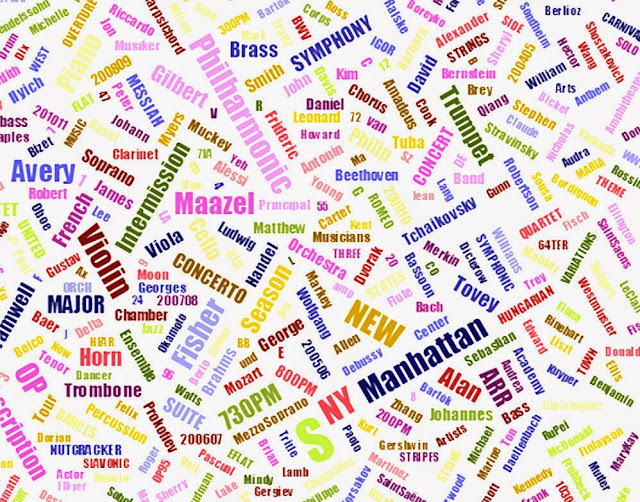Mozart MP3 download fatigue cured
 Lots of coverage On An Overgrown Path for Gyorgy Kurtag's 80th birthday, but there are still many people who don't know his music. So here as a break from all that Mozart are two free Kurtag MP3 downloads that are long enough to give a real taster, but short enough to mean you still have to buy a CD to fairly reward the composer and performers.
Lots of coverage On An Overgrown Path for Gyorgy Kurtag's 80th birthday, but there are still many people who don't know his music. So here as a break from all that Mozart are two free Kurtag MP3 downloads that are long enough to give a real taster, but short enough to mean you still have to buy a CD to fairly reward the composer and performers.Kurtág - Kafka Fragments op. 24 for Soprano and violin with Patricia Kopatchinskaja (photo above) violin and Anna Maria Pammer. Recorded in the Semper-Aula of the Federal Institute of Technology, Zürich by Leonhard Lenz 3.2.2004. Nr. 1 "Die Guten gehn im gleichen Schritt. Ohne von ihnen zu wissen tanzen, tanzen die anderen die Tänze der Zeit", Nr.2 "Wie ein Weg im Herbst: Kaum ist er reingekehrt, bedeckt er sich wieder mit den trockenen Blättern", Nr.3 "Verstecke sind unzählige, Rettung nur eine, aber Möglichkeiten der Rettung wieder so viele wie Verstecke", Nr.4 "Ruhelos, ruhelos"... Data rate 128 KBit/s, file size 2.9MB. Extract - timing 3' 10" -
Kurtág - Eight pieces for violin and cymbalom op.4, with Patricia Kopatchinskaja and Viktor Kopatchinsky (Cymbalom). Murten-Classics Festival 31.8.2003, recorded by Swiss Radio DRS2. Data rate 128KBit/s, file size 8.3MB. Complete - timing 9' 3" -
Both samples are linked from the excellent website of Patricia Kopatchinskaja (photo above) who is the violinist in the recordings. There are many other audio samples on the site, the contemporary composers represented include John Cage, Takuya Imahori, Gija Kantsceli, Thomas Larcher, Kumiko Omura, Alan Ridout and Otto Zykan. CDs can also be purchased, these include contemporary compositions by Johanna Doderer, Nikolai Korndorf, Dmitri Smirnov and Boris Yoffe.
If you arrived On An Overgrown Path looking for free Mozart MP3 downloads please don't feel cheated. Patricia Kopatchinskaja's web site has a download of the complete Mozart Sinfonia Concertante in E flat major with American Odin Rathnam playing viola with her. It is a big (25MB) file with 30 minutes of music, read a review here in German, and this is the file -
Audio samples are not hosted by On An Overgrown Path, and are Patricia Kopatchinskaja's copyright. They are strictly for non-commercial, personal and private use. Any other use needs permission, particularly multiple copying, use in other media, broadcasting, television or any commercial purposes.
Image credit - Patricia Kopatchinskaja. Image owners - if you do not want your picture used in this article please contact me and it will be removed. Report broken links, missing images and other errors to - overgrownpath at hotmail dot co dot uk
If you enjoyed this post take An Overgrown Path to Miniature celebration for Gyorgy Kurtag









Comments
I am the husband of Pat. Thank you for your interest. Indeed we think that Kurtag is a most underrated composer. We like everything he wrote, especially for string quartet.
Pat spent hours playing the Kafka-Fragments for the composer and his wife. He reportedly said that, although he sometimes is afraid for her violin, she can do everything he ever wished or dreamt about violins...
Sincerely
Lukas Fierz
not minor unless there's an intonation problem you're just being subtle about)with Patricia Kopatchinskaja is actually Odin Rathnam, not Tathnam (just a
couple of rare typoi): he's the concertmaster for the Harrisburg Symphony here and lives in the Central Pennsylvania area (loves fly fishing, too).
Thanks also for the posts on Shostakovich. I recently did an "up close & personal" post about two local performances of his 5th & 10th Symphonies (too
longwinded: if I had more time, I would've written less) and was finding it very difficult to separate what is viable from what is Volkov, stuff that has clearly
entered the Canon without being footnoted "Testimony: Suspect Factoid" (in the original sense of factoid as "something that seems true but I just made it up to
sound convincing").
However, I also find myself making conjectures: it's difficult not to make "assumptions" about the quote of his setting of Pushkin's "What Is in My Name" at the opening and again in the 3rd mvmt of the 10th, especially given its last lines:
"But silently, in time of anguish
Pronounce it softly while grieving
Say that my memory won't vanish
That there's a heart in which I'm living."
To me, this makes the whole Sym #10 far more personal than just the fact he used
the D-S-C-H motive as a musical signature (not to mention Elmira in the 3rd
Mvmt)!
I've never seen anything in writing about HIS thoughts on the significance of this poem and even the number of program notes I've read about it never mention
more than the poem's title, but nothing about it's content. Are you aware of anything in various biographies or personal accounts or in Volkov's "Testimony,"
for that matter, that references the meaning of this poem for Shostakovich and his 10th (not to mention the other works he used "DSCH" in)?
Thanks for any help, if you can!
Take care,
Dick Strawser,
Music Director, Evening Host & Tracer of Lost Chords
WITF-FM 89.5, Your Classical Music & NPR News Station
1982 Locust Lane
Harrisburg PA 17109
dick_strawser@witf.org
Dr. Dick's Blog http://witf.blogspot.com/
I've corrected the two mistakes - sorry about that. My brain kind of gets fried by some of these articles. As I wrote to another online friend yesterday so far all the errors have been recoverable, but I am dreading the biggie!
I urge readers to check out Dick's blog, it is worth a visit.